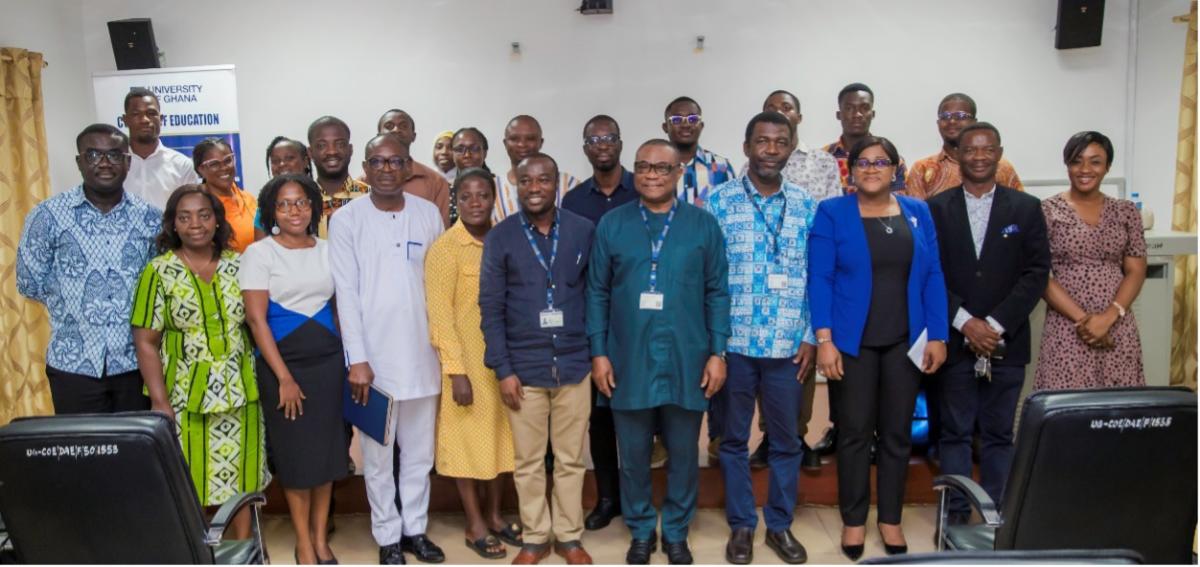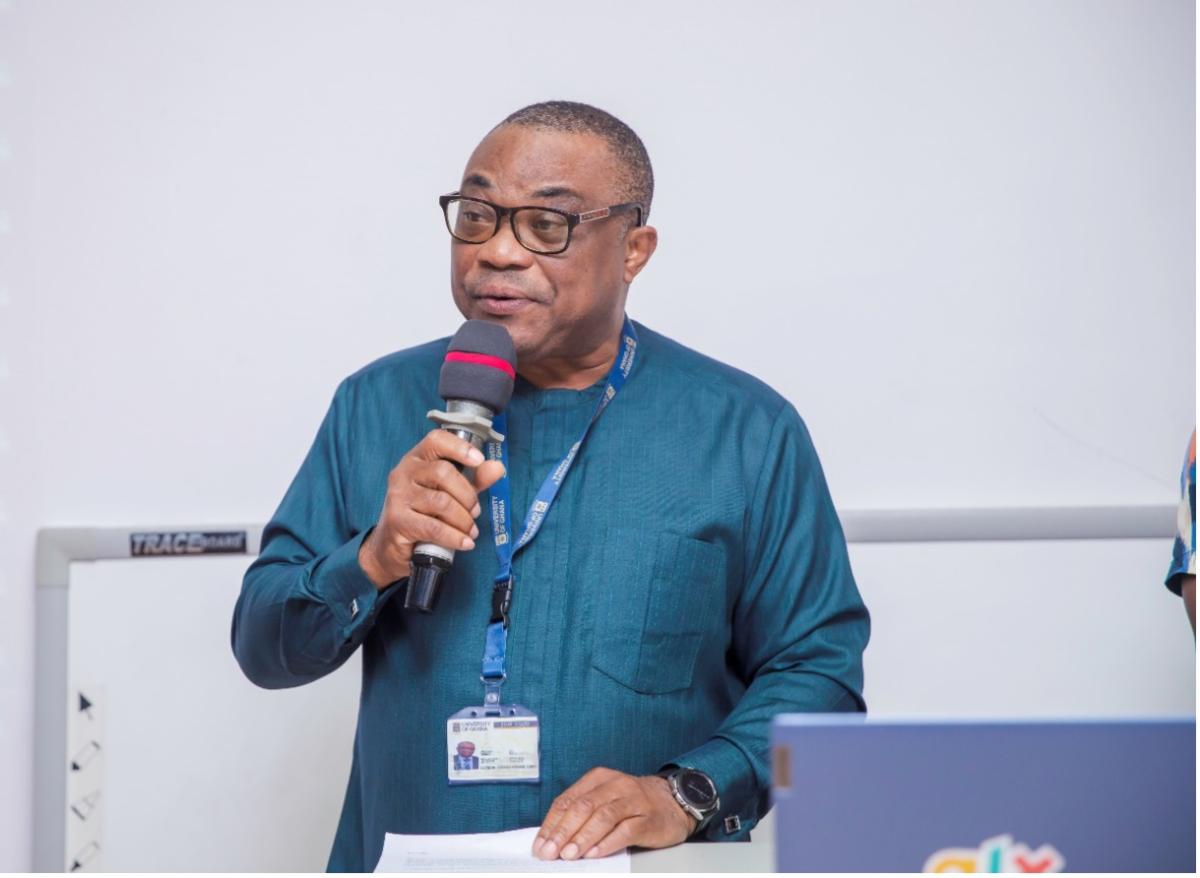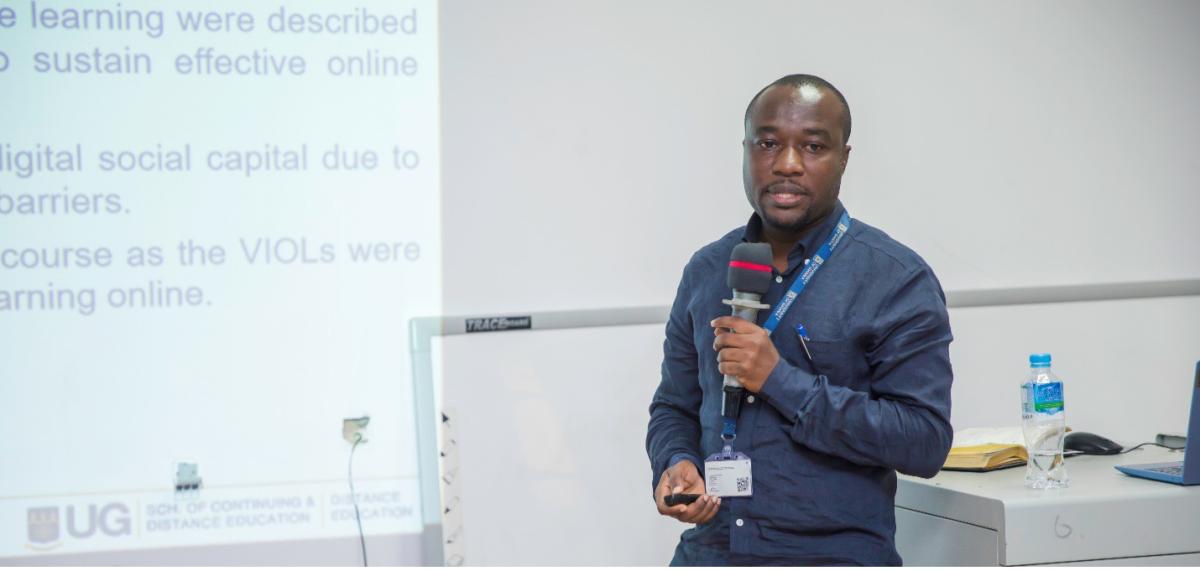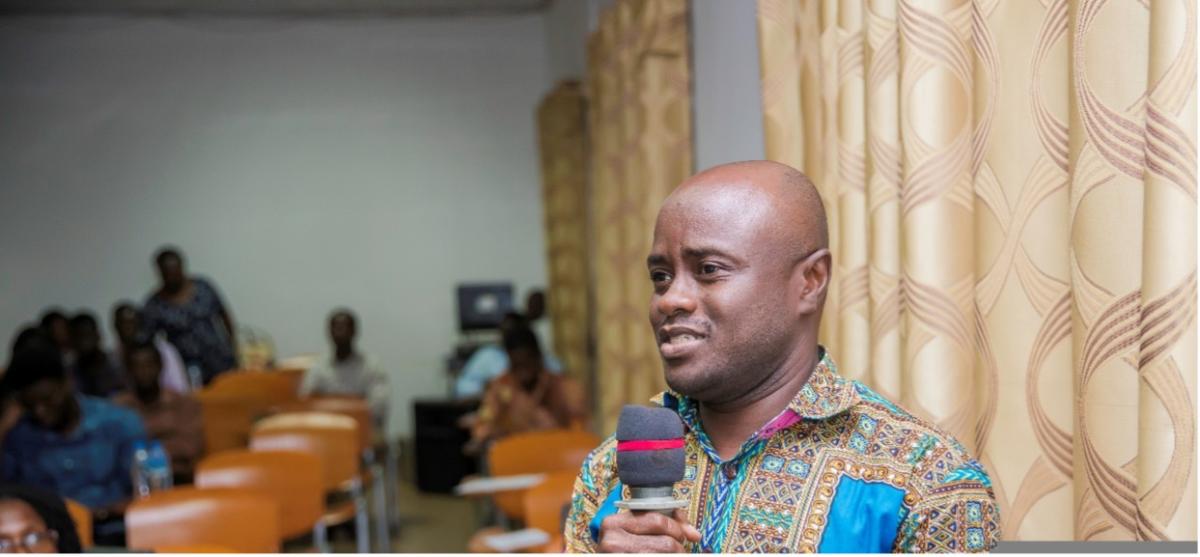




A group photograph of the lecturer and participants
On 13th July, 2023, Prof. Samuel Amponsah, Head of the Department of Distance Education, delivered a lecture on the topic “The ‘Shadow Pandemic’ in Online Learning: Perspectives of Visually Impaired Students from Ghana and Egypt.”
The lecture that was held at the Smart Classroom of the School of Continuing and Distance Education (SCDE), University of Ghana and it marked the first Inter-College lecture of the 2022/2023 academic year hosted by the College of Education.

Prof. Gordon Adika delivering the welcome address
In his welcome address, Prof. Gordon Adika, Dean of the School of Education and Leadership, who chaired the lecture on behalf of the Provost, College of Education stated that the Inter-College Lecture series sought to provide a platform for faculty members to share their research findings with the University community. He further highlighted that it is an avenue to foster discussions on ongoing research, thereby allowing participants to ask questions and contribute to research works. He indicated that the inter-college lecture had replaced the previously held interfaculty lectures as part of the scholarly lectures on the academic calendar.

Some participants listening to the lecture
Prof. Adika highlighted briefly on the inception of the inter-college lecture series at the College of Education, mentioning that this lecture was the eighth held since the adoption of the collegiate system of governance by the University in 2014. He indicated that seven lectures had been delivered to date, five by male faculty and two by female faculty. The first lecture, which was delivered by a female faculty member took place on March 16, 2017. Prof. Adika therefore encouraged female faculty and other members to actively engage and deliver lectures on various topics.

Prof. Samuel Amponsah delivering his lecture
During his presentation, the lecturer, Prof. Samuel Amponsah, gave an overview of the topic and explained the relevance of his study. He acknowledged that the COVID-19 pandemic had accelerated the digital agenda in teaching and learning. He emphasized that this was imperative in achieving the Sustainable Development Goal 4 and key to the promotion of diversity in education. Despite this, he was disappointed that learners with disabilities, especially visually impaired online learners were still disadvantaged during the pandemic, which calls for research in this area.
He indicated that shadow pandemic in the context of his research was used to explain the presence or absence of any condition that prevents Visually Impaired Online Learners (VIOLS) from meaningfully engaging in online learning. According to Prof. Amponsah, the COVID-19 pandemic had a negative effect on the learning experiences of visually impaired students as digital tools for online learning were either not accessible or usable to them. He further highlighted the absence and inadequacy of digital devices in higher education institutions during the pandemic for use of VIOLs at a time they needed these technologies the most. This, he averred, eventually left them in the ‘shadow’ during the pandemic.

A session of the participants at the lecture
Delving into the uniqueness of his research, Prof. Amponsah stated that a netnographic study was employed in this research, while the nascent Accessibility 4 Equity (A4E) was used to underpin the study. He explained that social media tools were used to elicit responses from 12 visually impaired online learners in higher educational institutions from the University of Ghana and the America University in Cairo, Egypt.
The findings of the research revealed that the studied institutions prioritised physical accessibility at the expense of intellectual and social accessibility, majority of the VIOLs did not benefit from digital social capital due to structural, pedagogical and systemic barriers. Additionally, he mentioned that other ‘shadows’ included stereotypical and ableist behaviours which resulted in the VIOLs considering themselves as the ‘silent minority’. However, he mentioned that some lecturers provided support to these learners by giving them individualised attention and extra time for assignments.
In his recommendation, Prof. Amponsah called for the formulation of agile, flexible and futuristic policies to ensure Accessibility 4 Equity (A4E) in virtual learning spaces, participatory approaches to policy development and implementation and a continuous professional development of instructors to aid in improving the learning experiences of visually impaired online learners. He added that higher education institutions should set up effective virtual therapeutic services that would be readily accessible to students. He also recommended that research should be carried out on the forms of training for online instructors and how they can impact online instructions.

Dr. Yaw Owusu Agyeman, a Senior Lecturer at the Department of Adult Education and Human Resource Studies commenting on the presentation
At the end of his presentation, participants were given the opportunity to ask questions and make suggestions on the topic for the lecture. The lecturer also responded to questions and elaborated on contributions from the participants for better comprehension of his lecture.
In his closing remarks, the Chairman, Prof. Adika stressed on the need for public education in enhancing the learning experiences of the VIOLs in higher education institutions. He stated that the study was important since it raised concerns that educational institutions must pay attention to. Prof. Adika indicated that the lecture had also informed the participants about the plight faced by visually impaired learners which had to be addressed in educational institutions.
A picture of Mrs. Regina Afari Boateng moderating the session
The lecture was moderated by Mrs. Regina Afari Boateng, School Administrator, SCDE. Present at the lecture were Mr. Joseph Oduro Nkansah, College Secretary of the College of Education, Mr. Jack Dotsey, Executive Director, Annual New Year School and Conference and Mr. Moses Musah Bawa, College Academic Affairs Officer. Heads of Department at the College of Education were also present as well as staff and faculty members from the College and the University. Additionally, some participants joined the lecture online.